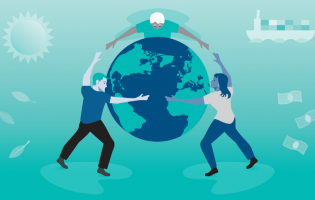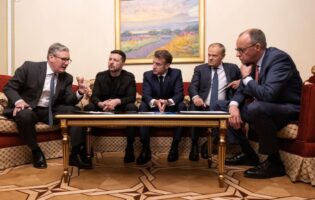Power Brokers in Difficult Times? The Role of German Political Foundations in Transatlantic Relations
On February 27, 2014, AGI hosted a seminar on “Power Brokers in Difficult Times? The Role of German Political Foundations in Transatlantic Relations” with Nicole Renvert, a Fellow at the Center for Global Cooperation Research, Käte-Hamburger Kolleg of the University Duisberg-Essen, and former Visiting Fellow at AGI. In the seminar, Ms. Renvert focused on why these political foundations were created in the U.S., how they developed, and what current political challenges they face.
Even a topic as seemingly un-controversial as the role of “Stiftungen” or foundations can evoke extreme views, as some see them as very helpful, some are distrustful of their purpose, and others even call them a threat. Foundations were originally created as re-education tools in Germany after World War II but soon developed into important actors in German foreign policy. They became widely known in the 1960s and 1970s when they successfully supported democratization efforts in Portugal, Spain, and Latin America and helped to bring down the authoritarian regimes of these countries. They were also instrumental in shaping the new political order by promoting democratization and civil rights in Central and Eastern Europe after the end of the Cold War and were involved in post-conflict transformation in former Yugoslavia in the 1990s. At present, they are one of the key players in the transformation of the Arab world and involved in the change processes in Ukraine.
In their transatlantic work, we can distinguish three phases in their development: The first phase began when the Konrad-Adenauer-Stiftung (KAS), Friedrich-Ebert-Stiftung (FES), and the Friedrich-Naumann-Stiftung set up their offices in the late-1970s to mid-1980s. They aimed at enhancing cooperation between members of the German Bundestag and members of the U.S. Congress. They also served as early warning systems for their headquarters in Germany, analyzed relevant topics concerning transatlantic relations, and identified key players in the political arena on both sides of the Atlantic. They were among the first German institutions to start an exchange program with Jewish organizations in the U.S. after WWII and thus had an active part in the reconciliation process with the Jewish World. Their offices served more than one purpose and were useful not only for the German political parties, but also for other key players. The second phase of their activities started after the Cold War. Here, foundations provided a platform for information and exchange, and were instrumental in explaining the many difficulties Germany faced in the process of unification. The third phase is post-9/11, when the German political foundations were called upon to not serve as mediators between the U.S. and Germany, but to become active political agents themselves. They provide a platform for exchange and have actively testified before the U.S. Congress and explained the different political positions vis-à-vis the intervention in Iraq to a larger American audience. They became instrumental in easing tensions by building on existing contacts and creating new networks.
Today, these foundations continue to be important actors but they face new challenges. Their active involvement in democratization processes is seen as critical. Some countries did not allow them to continue their work or monitor their activities very closely. The Konrad-Adenauer-Stiftung had to close its offices in Abu-Dhabi and in Egypt; KAS’ support for Vladimir Klitschko as presidential candidate in Ukraine is highly controversial. Countries like Russia, Turkey, or Indonesia distrust the activities of the foundations and issued new regulations to better monitor their work. There are also structural challenges to their work. The environment has changed due to a growing number of private actors involved in democratization and political dialogue. Some of the foundations are facing financial shortages in the near future and need to come up with new concepts to stay relevant. They all have to be innovative to attract a new generation of political leaders. Their transatlantic activities now cover more than the bilateral dialogue between Germany and the U.S. and, as such, expectations are growing. Can they successfully adjust to these new tasks and challenges?
Ms. Renvert’s book Power Brokers in Difficult Times? The Role of the German Political Foundations in Transatlantic Relations will be published this spring.
Please contact Ms. Kimberly Frank at kfrank@aicgs.org with any questions.






